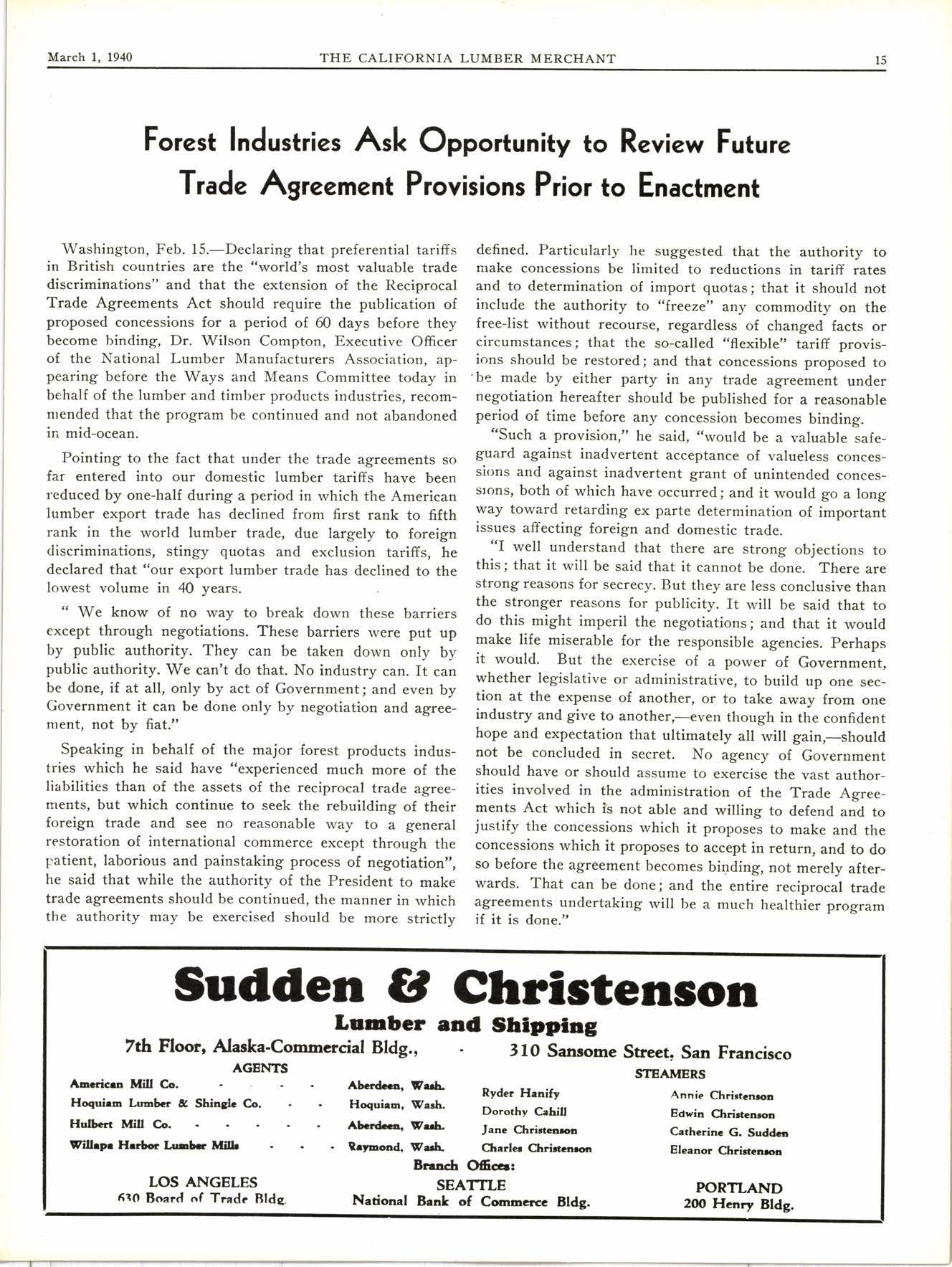
2 minute read
Forest Industries Ask Oppottunity to Review Future Trade Agreement Provisions Prior to Enactment
Washington, Feb. 15.-Declaring that preferential tariffs in British countries are the "world's most valuable trade discriminations" and that the extension of the Reciprocal Trade Agreements Act should require the publication of proposed concessions for a period of 60 days before they become binding, Dr. Wilson Compton, Executive Officer of the National Lumber Manufacturers Association, appearing before the Ways and Means Committee today in behalf of the lumber and timber products industries, recomnrended that the program be continued and not abandoned in mid-ocean.
Pointing to the fact that under the trade agreements so far entered into our domestic lumber tariffs have been reduced by one-half during a period in which the American lumber export trade has declined from first rank to fifth rank in the world lumber trade, due largely to foreign discriminations, stingy quotas and exclusion tariffs, he declared that "our export lumber trade has declined to the lowest volume in 4O years
" 'W'e know of no way to break down these barriers except through negotiations. These barriers were put up by public authority. They can be taken down only by public authority. We can't do that. No industry can. It can be done, if at all, only by act of Government; and even by Government it can be done only by negotiation and agreement, not by fiat."
Speaking in behalf of the major forest products industries which he said have "experienced much more of the liabilities than of the assets of the reciprocal trade agreements, but which continue to seek the rebuilding of their foreign trade and see no reasonable way to a general restoration of international commerce except through the patient, laborious and painstaking process of negotiation,,, he said that while the authority of the President to make trade agreements should be continued, the manner in which the authority may be exercised should be more strictly
Lgabcr
1ryb vllt defined. Particularly he suggested. that the authority to make concessions be limited to reductions in tariff rates and to determination of import quotas; that it should not include the authority to "free ze" any commodity on the free-list without recourse, regardless of changed facts or circumstances; that the so-called "flexible', tariff provisions should be restored; and that concessions proposed to 'be made by either party in any trade agreement under negotiation hereafter should be published for a reasonable period of time before any concession becomes binding.
"Such a provision," he said, "would be a valuable safeguard against inadvertent acceptance of valueless concessions and against inadvertent grant of unintended concessrons, both of which have occurred; and it would go a long way toward retarding ex parte determination of important issues affecting foreign and domestic trade.
"I well understand that there are strong objections to this; that it will be said that it cannot be done. There are strong reasons for secrecy. But they are less conclusive than the stronger reasons for publicity. It wil be said that to do this might imperil the negotiations; and that it would make life miserable for the responsible agencies. perhaps it would. But the exercise of a power of Government, whether legislative or administrative, to build up one section at the expense of another, or to take away from one industry and give to another,-even though in the confident hope and expectation that ultimately all will gain,-should not be concluded in secret. No agency of Government should have or should assume to exercise the vast authorities involved in the administration of the Trade Agreements Act which ls not able and willing to defend and to justify the concessions which it proposes to make and the concessions which it proposes to accept in return, and to do so before the agreement becomes binding, not merely afterwards. That can be done; and the entire reciprocal trade agreements undertaking will be a much healthier program if it










